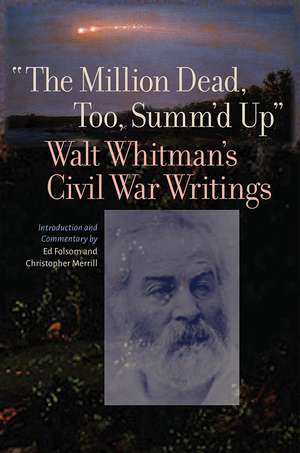"The Million Dead, Too, Summ'd Up": Walt Whitman's Civil War Writings: Iowa Whitman Series
Autor Walt Whitman Comentarii de Ed Folsom, Christopher Merrillen Limba Engleză Paperback – 2 mar 2021
The real democratic reader, Whitman said, “must himself or herself construct indeed the poem, argument, history, metaphysical essay—the text furnishing the hints, the clue, the start or frame-work,” because what is needed for democracy to flourish is “a nation of supple and athletic minds.” Folsom and Merrill model this kind of active reading and encourage both seasoned and new readers of Whitman’s war writings to enter into the challenging and exhilarating mode of talking back to Whitman, arguing with him, and learning from him.
Preț: 258.14 lei
Nou
Puncte Express: 387
Preț estimativ în valută:
49.39€ • 51.71$ • 40.87£
49.39€ • 51.71$ • 40.87£
Carte indisponibilă temporar
Doresc să fiu notificat când acest titlu va fi disponibil:
Se trimite...
Preluare comenzi: 021 569.72.76
Specificații
ISBN-13: 9781609387464
ISBN-10: 1609387465
Pagini: 240
Ilustrații: 1 b&w figure
Dimensiuni: 156 x 235 x 18 mm
Greutate: 0.4 kg
Ediția:1
Editura: University of Iowa Press
Colecția University Of Iowa Press
Seria Iowa Whitman Series
ISBN-10: 1609387465
Pagini: 240
Ilustrații: 1 b&w figure
Dimensiuni: 156 x 235 x 18 mm
Greutate: 0.4 kg
Ediția:1
Editura: University of Iowa Press
Colecția University Of Iowa Press
Seria Iowa Whitman Series
Recenzii
“Two ideal readers—a critic and a poet at the top of their games—comment brilliantly on forty selections from Drum-Taps and Memoranda During the War, along with relevant letters to illustrate the pathos and poetry that run hand in hand through Whitman’s rendering of the Civil War. Strongly recommended for both students and scholars.”—Jerome Loving, author, Walt Whitman: The Song of Himself
“When Whitman’s most knowledgeable and important interlocutor, Ed Folsom, teams up with one of our country’s wisest and most astute poets, Christopher Merrill, the result is essential reading for anyone who would better understand Whitman and the country he sang, which is still reckoning with its legacy of slavery and violence.” —Matt Miller, coeditor, Every Hour, Every Atom: A Collection of Walt Whitman’s Early Notebooks and Fragments
“When Whitman’s most knowledgeable and important interlocutor, Ed Folsom, teams up with one of our country’s wisest and most astute poets, Christopher Merrill, the result is essential reading for anyone who would better understand Whitman and the country he sang, which is still reckoning with its legacy of slavery and violence.” —Matt Miller, coeditor, Every Hour, Every Atom: A Collection of Walt Whitman’s Early Notebooks and Fragments
Notă biografică
Ed Folsom is Roy J. Carver professor of English at the University of Iowa, editor of the Walt Whitman Quarterly Review, codirector of the online Whitman Archive, and editor of the Iowa Whitman Series at the University of Iowa Press. He is author or editor of numerous books and essays on Whitman and other American writers. He lives in Iowa City, Iowa.
Christopher Merrill is director of the International Writing Program at the University of Iowa. He has published six collections of poetry, including Watch Fire, many edited volumes and books of translations, and six works of nonfiction, among them Only the Nails Remain: Scenes from the Balkan Wars. He lives in Iowa City, Iowa.
Christopher Merrill is director of the International Writing Program at the University of Iowa. He has published six collections of poetry, including Watch Fire, many edited volumes and books of translations, and six works of nonfiction, among them Only the Nails Remain: Scenes from the Balkan Wars. He lives in Iowa City, Iowa.
Descriere
This book is the first to offer a comprehensive selection of Walt Whitman’s Civil War poetry and prose with a full commentary on each work. Ed Folsom and Christopher Merrill carry on a dialogue with Whitman (and with each other) as they invite readers to trace how Whitman’s writing about the Civil War develops, shifts, and manifests itself in different genres throughout the years of the war. The book offers forty selections of Whitman’s war writings, including not only the well-known war poems but also his prose and personal letters. Each are followed by Folsom’s critical examination and then by Merrill’s afterword, suggesting broader contexts for thinking about the selection.











